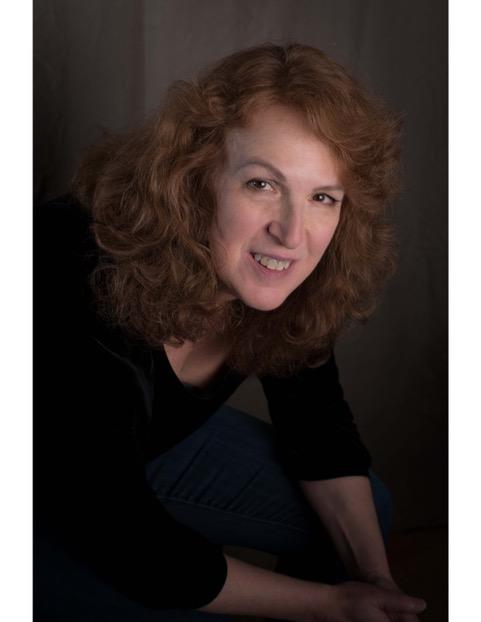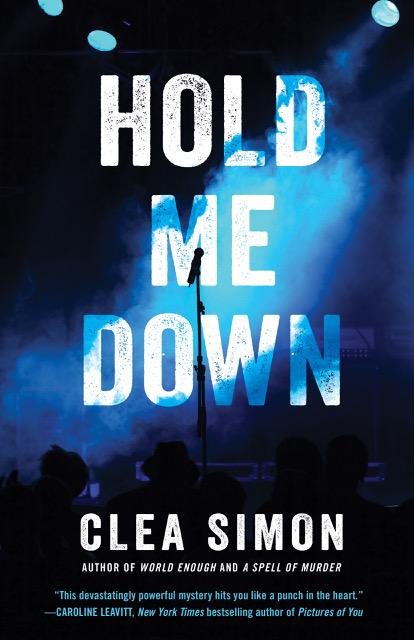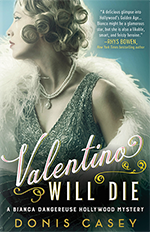
It’s time for another entry in my monthly series of author essays called Tell Me Your Story, where I invite successful authors to share their life experiences and how those experiences have influenced their writing. After I read Clea Simon’s remarkable piece in the Boston Globe last month, I couldn’t type fast enough to ask her to PLEASE share her story with us. I will warn you, Dear Readers, Clea’s story is harrowing, and a true example of overcoming – and even using – adversity on the way to finding success.
What can I say about Clea? I’ve known her work for years and have greatly enjoyed her many cat-centric mysteries, some cozy, some dark, many paranormal. I’ve also admired her tremendous work ethic. A former journalist, Clea is the Boston Globe-bestselling author of three nonfiction books and 29 mysteries. While most of these (like her recent A Cat on the Case) are cat cozies/amateur sleuth series, she also writes darker standalone crime fiction, like the rock and roll psychological suspense World Enough, named a “must read” by the Massachusetts Book Awards. Her latest, Hold Me Down, is a psychological suspense novel which returns to the music world, focusing on the connections and abuses in this tight-knit community, as well as love in all its forms. Please do yourself a favor and add Clea Simon to your list of must-read authors.

“When are You Going to Stop Being Such a Good Girl?”
Clea Simon
In much crime fiction the emphasis is on the crime, if not the criminal. But recently, as I branched into the subgenre known as “psychological suspense,” what interests me are the victims and how they came to be vulnerable. Victims can be made by circumstance: the car that breaks down on a deserted street. The unhappy resemblance to another, or the unlucky appearance of a potentially violent person at a moment of tension or decompensation. At such times, an assault can seem random. A stroke of bad luck
Often it may be. But at times, I have learned, it is not. Because at times circumstances can set us up to be vulnerable. To be a victim.
I learned this years ago, during an intense self-defense class called “Model Mugging.” This class drilled us in the best physical responses to an attack – how to strike out without hesitation, using our body’s particular strengths. How, if thrown to the ground, for example, to kick and keep kicking. How to shout. Despite its name, this course wasn’t designed to stop a simple mugging. One of the first rules, in fact, was: “Give up your wallet. It’s not worth it.” But if someone is trying to harm you? To stuff you into a vehicle and abduct you? Fight back. You may be fighting for your life.
Ostensibly, one reason I took this course was that I had been mugged. Coming home late one night, I had been followed into the foyer of my building and thrown up against the wall. I was told there was a knife, although I have no recollection of feeling anything other than the metal of the foyer mailboxes. I certainly never saw anything.
During the Model Mugging course, I was shown how I’d been “interviewed” before the attack. Tried out as a potential victim. I’d been working on the night desk of the Boston Globe, which meant I got off work around midnight. I recalled that, walking the few blocks from where I’d found an on-street parking space, a stranger had called out asking if I knew the time. I’d been tired. Distracted, and couldn’t be bothered. “Sorry, no,” I had mumbled, or words to that effect. I hadn’t looked up. That vague response, I learned, had alerted the mugger that I was not attentive.
In retrospect, my automatic apology – “sorry”– undoubtedly amplified the signal. It was certainly something I became aware of, and in the years since, I’ve tried to stay conscious of the signals I’m sending out, especially when I’m alone or at night. But as I’ve since realized, I had already been conditioned to be a victim, long before the attack.
Let me make one thing clear: I have no patience with victim blaming. It is neither our fault nor our responsibility that we are assaulted, robbed, or worse. We – I – certainly never “asked for it,” just as we never asked for the conditions that may have made us more vulnerable – the laggard in the herd, easy to pick off. And, as I noted above, many people are victimized without having any particular vulnerabilities.
But during that class, I became acutely aware of the set of circumstances that had set me up – as much as the quiet of the hour, the long blocks between my car and my home.
Where that came from is difficult, if not impossible, to trace with certainty. However, in retrospect – and thanks to decades of therapy – I can place it in my family of origin. I’m the youngest of three, and both my older brother and sister developed schizophrenia in adolescence, exhibiting their first symptoms when I was about eight. My sister, in particular, terrorized me, killing my pets and frightening me with her outbursts, while my brother largely became withdrawn – a looming, blank-eyed presence who scared me with his indifference, so foreign from the adoring big brother I had come to know.
Although both would end up diagnosed, treated, and at times hospitalized, neither were able to successfully manage this horrible disease, and my brother took his own life thirty years ago. In part, they were victims of the times – medications in the ’60 and ‘70s were still pretty limited. In part, and aggravating the effects of the disease, the stigma and denial around their illness made any treatment infinitely more complicated – and amplified our family’s dysfunction.
My parents were well educated; my father was a doctor. Still, they found it difficult to cope. Despite access to every medical and psychological intervention then available, they were run ragged, desperately trying to hold things together as my brother wandered off, self-medicating with street drugs and my sister went off on wild, screaming rages. Even after both successfully left home to begin college, the problems continued – my brother was hospitalized for his erratic, often frightening behavior during his freshman year. My sister, who seemed to be coping in an off-campus apartment near our home, would begin to act out – resulting in frantic, angry calls to my parents and, at times, the police. (I remember one landlady unable to understand why my sister had spread excrement on the walls.) For a few years, they both cycled in and out of hospitals and our home, and my parents spent many evenings in family therapy groups. At these, as often happened in that era, my parents were often blamed for causing these diseases – now understood to be at least partly genetic – through their cruel or unusual parenting, a dynamic that only added to the stress and sorrow in our home.
This was the background to my later childhood. From the age of eight on, the scary – the abnormal – was the norm in my house, in that it was customary. Older siblings, after all, are who we pattern ourselves on – the models for growing up. Your brother turns 16 and gets his driver’s license, you expect to as well. He turns 18 and is hospitalized, and you think, well, maybe you will too. Your sister goes from playing Beatles records to locking herself in the bathroom and screaming. You think, this must be what turning 16 is like. It didn’t matter that my friends’ families were different. This was how things were in my home. I came to believe it is, as they say, what it is.
More subtle, however, and, I believe, in some ways more damaging, was the pressure from my parents. As much as I may have expected – dreaded – my own breakdown, from the ages of eight through college, I also knew at some level I’d been spared – at least thus far – and that my relative normalcy, my sanity, was the bulwark of my family. For as long as it lasted, I was the “good child,” the one who didn’t cause my parents’ distress. This was a gratifying role in many ways. It’s nice to be the favorite! But the pressure that comes with it – to always be on, be happy, and be successful – can be intense, especially when that happy smiling face must be maintained when one’s siblings, when one’s entire family structure, is collapsing in tears and rage.
It’s a calm I maintained in part by a cocktail of self-delusion and acclimatization. As I’ve said, to some extent the family madness became normal because it was what I grew accustomed to. But it also began at some level to seem like I had some control over it – smile and the bad will go away. Ignore the warning signs, your instincts. Just keep on being the happy child. Distinguish yourself from your siblings – the ones who make your mother cry – by being the one who caused no problems, who never complained. The good girl, who could entertain herself quietly for hours, withdrawn into her imagination and her books.
These traits appeared to serve me well – until they didn’t. At one point, in my twenties, I found myself in a ridiculous job situation, unable to advocate for myself and afraid to quit. Coming to my parents with the problem, I was stunned by my father’s response:
“When are you going to stop being such a good girl?” In my memory, he was practically spitting. “And start being a smart woman?”
That was a pattern I began to recognize. One that had, in fact, already cost me. To keep the peace, I had learned to accept what scared me without complaint. To quell my anxiety, I had taught myself that if I only worked harder – and kept quiet – I could maintain some kind of equilibrium. The illusion that I had control was so seductive that I never realized its downside. That when things went awry, I was to blame. My own version of victim blaming, this had cost me long before that mugging. Long before, even, my father’s sharp retort.
As a freshman in college, during my first months on my own, I was raped by a classmate, a man who lived in my dorm and who had knocked one night, offering a glass of a sweet lime concoction he’d whipped up. (I’d find out later that it contained an over-proof rum that he kept on hand for just such occasions.) I would wake later to find him on top of me, his assault interrupted only by my sudden intense nausea.
I pushed him off and ran to the bathroom, and that, I thought, was that. I didn’t tell the resident adviser who theoretically supervised us both. I kept it from my parents and most of my friends as well. Until recently, in fact, I had trouble calling the assault what it was: rape. Instead, I blamed myself. For being “stupid” For being vulnerable. The only time I lashed out was when I found I was pregnant as a result of the assault. Furious, I ran down the stairs and banged on my rapist’s door, only to have a friend grab me and lead me away. “Don’t give him the satisfaction,” she said. I don’t think she meant he would have reveled in his fertility. I believe she knew he would enjoy how he had hurt me – humbled me, triumphed over me in some way. At any rate, I let her lead me away, and terminated the pregnancy as soon as was feasible without him ever knowing.
Some of this was the times. In the ‘80s, such assaults were still called “date rape” and considered a different, lesser kind of assault. But in retrospect, I see my own particular vulnerabilities at play as a “good girl,” if not a “smart woman.” Eager to please, and unwilling to listen to any internal warnings.
Years later, I’ve worked through most of these issues – in part through my writing. I’ve asked myself the questions: Would I have become a different person if I had acted out more? If I had let myself feel my own fear and confusion early on? Or, on another level, would I still be writing about crime, even imaginary ones? Would I still be so interested in the victims?
Clea Simon is the Somerville-based author most recently of Hold Me Down. She can be reached at cleasimon.com. A version of this essay ran in the Boston Globe.
You can also find her @Clea_Simon (Twitter), and @cleasimon_author (IG).



More Places to Go
Donis on Facebook
Type M for Murder